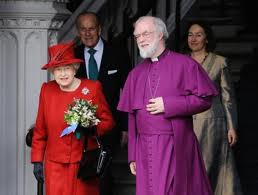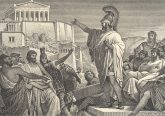
This week a British Cabinet minister gave a speech in the Vatican decrying the spectre of militant secularism stalking the nations of Europe and bemoaning the corresponding marginalisation of the faithful. The Queen has also weighed in, speaking at Lambeth Place this week about the benefits of the Church. “We should remind ourselves of the significant position of the Church of England in our nation’s life,” she said. “The concept of our established Church is occasionally misunderstood and, I believe, commonly under-appreciated.”
But despite their worry-inspired justifications, these comments, I believe, fall within a broad trend of the reintroduction of faith into the public sphere by British politicians and vociferous cries of persecution from the leaders of faith based organisations. Much of this is being played out through a discourse on rights — in this case the right to religious practice.
But their argument is somewhat flawed, in my view. When one examines the specifics of these claims of persecution or of the denial of civic rights it becomes apparent that they are labouring under a misinterpretation of the nature of the right to religious freedom. Consider for instance the recent judgement that deemed the practice of saying prayers before a council meeting unlawful. This law in no way prevents councillors from saying prayers — they can say them in their own home, in church or even in the room before the formal meeting starts. All it prevents them from doing is imposing the religious practices of one group upon others, out of concern they might feel uncomfortable.
Similarly, consider the case of the couple who were successfully prosecuted for refusing to grant a room to a homosexual couple on the grounds that homosexual practice is a sin according to biblical texts. In actuality, I suggest, a violation of their religious freedom would have entailed someone forcing them to disobey the tenants of their religion by engaging in homosexual practices themselves. Preventing individuals from discriminating against others on the grounds of their sexuality is not a violation of the right to religious expression.
These misunderstandings are a symptom of a previously privileged group to whom society no longer pays much deference. It is true that the Church and other religious bodies are no longer immune from public criticism or scrutiny, and that it is no longer considered acceptable for the religion of the majority to drown out dissenting voices. But a simple loss of privileges is a far cry from persecution.
Baroness Warsi’s desire to “give faith a seat at the table in public life” should trouble all who cherish the values of a free and peaceful society. There are good reasons for the secularist desire to separate religion from public life and not only because it causes many to feel alienated or discriminated against. Take for example the issue of faith schools, which many within politics appear to believe help promote ethical values within the young generation. However, in a country with such a diverse range of ethnic and religious groups as Britain, religious schools serve as a method for the perpetuation of the self-isolation of communities. If a child lives within an area of Muslims, Christians, Jews and Hindus is it right that they should go to a school with only Muslims or only Christians? How will this teach the child the ability to relate to the rest of their community? We only need to look to Northern Ireland to understand the consequences of dividing a community from birth.
The sentiment expressed by Baroness Warsi is also a fundamentally undemocratic one. In a system of representative democracy the role of those elected is to represent the interests and wishes of those who elected them and to enact the mandate they are given. Unless a politician is elected upon the basis of a pious manifesto they have absolutely no mandate to act upon their own religious sentiments within the public sphere or to make decisions on behalf of their electors based purely upon their faith.
Similarly, the endorsement of a religion by the state is incredibly problematic when considering the principle of equality and freedom for religious practice. Whilst, in so doing, the state does not actively prevent an individual from practicing an alternative religion it does send out a message from the state that it is not the ‘approved religion’. Such an approach is damaging for society as a whole as it blurs the boundaries between the private and the public sphere and renders unclear the frontiers of the areas of social life which the state is considered legitimate in regulating.
It is also problematic for democracy in more holistic ways. This is because when a leader of a country refers to it as a ‘Christian Nation’, that necessarily implies that inhabitants who do not subscribe to this doctrine are somehow lesser or ‘incomplete’ citizens as they fail to adhere to the expected values of that society. Why, you may well ask, is it acceptable for a politician to refer to Britain as a ‘Christian’ country when it has already been acknowledged as unacceptable to refer to it as a ‘white’ country? The argument that it should be regarded as such because has a Christian heritage and tradition carries little real relevance – Britain also has a history of believing in the inequality of the sexes and the legitimacy of the slave trade. Times change.
Alistair Campbell once said of the New Labour government “we don’t do God”, and there remains strong reasons why the current government should continue to abide by this principle. Even if religion gives an individual personal strength and strong morals, bringing religion back into politics is not only undemocratic; it is divisive and alienating for those who the British state wishes most fervently to integrate.
Kate Brooks is an Oxford MPhil student in International Relations.








No Comment